#the arguments would be insane
Explore tagged Tumblr posts
Text
SOMEBODY GET THESE TWO A PODCAST TOGETHER


#the arguments would be insane#“you have the floor” “DO I? DO I HAVE THE FLOOR?” YES YES YOU DO“#Kobble would pull the “LALALALA NOT LISTENING” with the fingers in the ears and all 😭😭😭#my two little meow meows. i love 2024 horror#“can we please talk about the state of the religious economy right now??” Reed probably#at some point theyd both just be singing#i'll be their third that just nods and goes “uhuh. yeah. really? no yeah”#religious dialogue 👋👋#longlegs#heretic#mr reed#dale kobble
446 notes
·
View notes
Text
Jason travels to an alternate universe where Bruce only cares about being Batman. He took in each of his kids to serve the mission, not be his children.
Now, faced with alternate versions of his family, Jason has to grapple with the fact that his Bruce does care, that he is his father. Because the man in front of him now, trying to send him home, isn’t even close.
#batman#jason todd#bruce wayne#redhood#batfam#batfamily#this bruce went one of two ways 1) running his kids into the ground and they’re basically unrecognizable to jason or 2) worked them so hard#they couldn’t take it and left the business entirely and he’s completely alone except the JL which doesn’t like him but he is necessary#sure crime is down but bruce’s crusade is just that an actual crusade because he treats his sons like soldiers and everything comes second#to the mission. i don’t even know if damian exists in this universe because the idea of bruce having romantic relationships is laughable#although here he might be more closely aligned to talia because they’re both mission oriented and having a legal heir for their literal#legacy might appeal to him idk. just that jason shows up and it’s like his brothers have military ranks instead of names. none of them have#real jobs or even friends because they eat sleep work live at the manor and would never leave the batcave if it weren’t for public#appearances. it’s insane to see dick without his personality or tim who really does act like a robot and not a person. i don’t know if steph#cass and duke would stick around for this (or alfred for that matter i’m 50/50)#but when jason does get back everyone is shocked that he sticks around the cave and manor for a couple weeks checking in on everyone and#making the effort to do things unrelated to mask business. he has to write a report about the incident and he struggles to even put into#words how wrong it felt. his arguments with bruce also skew slightly because he can’t claim bruce doesn’t care in general just that he#doesn’t care about him or express it enough or in the right way. a far cry from the usual spiel and bruce is concerned so they talk it out
1K notes
·
View notes
Text
Remember when Chimney packed up his infant daughter and left the 118 to go find Maddie and no one knew if or when he was coming back, and his best friend and longtime work partner who never even attempted to co-parent his child just gave him a big hug and smiled a little bit sadly and wished him luck, no muss no fuss?
MEANWHILE, freak4freak over there
#911 on abc#buddie#08x09: sob stories#chim and hen are the perfect duo to show precisely how actual work friendships that grow into lifelong friendship actually works#and to really drive home the point that whatever the fuck is going on between Buck and Eddie IT AIN'T FRIENDSHIP#hen was like 'you do what you gotta do chim'#meanwhile buck and eddie had several arguments about stuff they normally would never argue about#and said literally ANYTHING other than what they actually wanted to say to each other#even at the end they were leaving so fucking much left unsaid#the more I think about everything that went on last week the more insane I am about it
363 notes
·
View notes
Text
How it feels to not like timebomb after s2

#I'M NOT A HATER I SWEAR I ACTUALLY REALLY LIKE IT ON PAPER#i do however think that it came literally out of nowhere and was hella rushed and kinda ridiculous#like. if the argument is that original ekko fell in love with jinx it doesn't make sense because they were enemies for most of their lives#if the argument is that current ekko fell in love with au powder and now projects these feelings on jinx it's kinda uh. messed up#because she's a whole different person. entirely. it doesn't matter if both these version started out as a 9-year old powder. they had#extremely different lives and experiences and thinking that “there's still this kind of powder in jinx deep down” is straight-up awful#OR even if he didn't project his feelings for powder on jinx why would he love her in the current universe? last time they met she blew them#up and now she wants to commit suicide. there's literally no reason for him to have any kind of feelings except the slight friendly#affection that's left from all those years ago. and yet the show and most importantly the fandom treats them like a couple??? i don't get it#also it's kinda insane that s2 turned jinx and ekko into flat shipping material#again. obviously i have nothing against the shippers and do not condemn it in any way. i'm just expressing my thoughts on the matter#also what pisses me off the most. is how in ep9 jinx in fully painted with ekko's symbols here and there. has the bandage (?) on her chest#like vi. has a hood that looks like a drawing that isha made. and yet there's no fishbones or any reference to silco at all#i mean. i get it s2 hates him but i can't help it#they gave her all these relationships and pretended that they're significant to her and yet they didn't have any proper development#to really earn it#arcane critical#arcane season 2#anti timebomb#jinx arcane#ekko arcane
299 notes
·
View notes
Text
The Significance of the Key and how it ties back to a Cut Scene
So two-ish weeks ago I reblogged @le-trash-prince post remarking in the tags that I had noticed an old-fashioned key by Kim's hand.

Which that observation got promptly forgotten in the wake of all of that with the feeding scene. (Can you blame me?)
But today in episode 8, we get this scene:

Kenta handing off an old-fashioned key to Pete to investigate - one we learn through mostly a flashback (and Kenta explaining) that it was from Way and held ties to a secret group inside Tony's organization. (One Way was in or at least had enough dirt on that Manit tried to recruit him for his knowledge to overthrow Tony.)


The whole scene, but these two sentences (only half seen in the first pic) I've screen shot really pinged something in my brain.
"Before the incident with the Chen family, Way handed me this key." "And I ended up in jail."
It reminded me of very similar verbiage of this behind-the-scenes sentence that we know got cut from the show.

That got me thinking that what was cut from the feeding scene was Kenta showing Kim the key and giving a condensed and/or vague explanation of what we learned in episode 8.
Which, considering what I know of television writing and storytelling, makes absolutely perfect sense why it got cut.
If we were already going to get the exposition of the key through a flashback and Kenta explaining it to Pete, then unless Kim himself is going to be the Key (pun unintended) to its eventual use and/or discovery of its use - then there is no need for the key to be introduced during the feeding scene two episodes prior. Hence why the whole key part of episode 6 was cut - the show is working with a limited amount of time to fit as much content/plot in the narrative as possible, so anything unnecessary is going to hit the editing floor.
(Could they maybe have edited out the cut parts a little more smoothly? Sure. It was likely hard to not include any shots that had the key. Could they have maybe shot something to fill that cut content? Absolutely. Likely through the limited time and money left for the editing, what aired was the best they could manage.)
It does, however, mean that we as the fandom can take that canon-adjacent information and apply it to the narrative of the story/plot (through meta or fanfiction or whatever) if we so choose to! 🤗🤗
On another note:

I am about 99.9% sure that this box right here is what the key is going to open. We'll just have to see if that's the case in later episodes!
#pit babe the series#pit babe#pit babe 2#meta#kimkenta#kentakim#long post#I have other thoughts™ about the significance of kenta telling kim about the key before he told pete#if we consider this cut/deleted scene as still canon#like narratively there should be no reason why kenta brings this to kim unless he later finds out the key's use#but the significance of kenta trusting kim with knowledge of tony and his past to a supposed outsider before pete#(and yes we can make the argument that pete might have an adverse reaction to anything related to way)#it just means so much that kenta after that heart-to-heart seems to have made kim his confidant - his most trusted#over anyone else who experienced tony!! over pete!!#kim proved over and over again he could be trusted and if kim knowing about the key had worked in the narrative#we the audience would have seen that kenta picked kim first as the person who he would go to for help and advice#and that makes me go a little insane
73 notes
·
View notes
Text
Queer relationships don’t need to be validated or made canon through a kiss. There’s such a double standard that when characters of the opposite sex are so much as friendly to each other they are now canonically romanticly involved but characters of the same sex/those who are genderless can literally do all sorts of romantic things and straight people will rationalize it to an absurd degree. They will only accept it’s romantic when there is a kiss or an “I love you” (and even then they will find ridiculous ways to say it’s platonic) and that’s unfair and disingenuous to what romantic relationships are. Let characters be in a canonical relationship without the need for explicit physical intimacy.
That being said Eddie and Venom better make out sloppy style in this movie or I swear to god.
#Sony please do this for me I need to prove the Marvel dudebros wrong 🙏#don’t get me started on how they literally do kiss and say I love you and somehow people still call us delusional#the mental gymnastics are insane#anyway this is my current predicament#do I advocate for a kiss because I think it would be cute and also prove people wrong#or do I advocate for my belief that they are already canon and we shouldn’t need anything more for people to understand that#I could make the same argument about good omens people said Aziraphale and Crowley were “just friends” until they kissed#drives me up the wall man#venom#symbrock
222 notes
·
View notes
Text
I DONT THINK CLACE IS GONNA NAME ANY OF THERE FUTURE BABYS AFTER DEAD FAMILY MEMBERS OR PAST HERONDALE NAMES

#bruh there first son is not being named William#and why do people even bring up Stephen or Jonathan??? 😭😭#ESPECIALLY Jonathan gets me mad like hello???!! did we all read the same city of lost souls?#I think arguments could be made for Luke#but to me they seem like people who would give there baby’s entirely new names#also I feel like Jace would have the most insane baby name suggestions#however if you support this notion that they would (UNLESS YOU THINK IFS JONATHAN) than I do understand and support you#the shadowhunter chronicles#tsc#shadowhunters#cassandra clare#tmi#the mortal instruments#clary fairchild#Jace herondale#Clace#clary x jace
106 notes
·
View notes
Note
May I give Insaine!Narrator headpats? (I love him sm. He is now one of my many Narrator sons/children.🫶🏻)
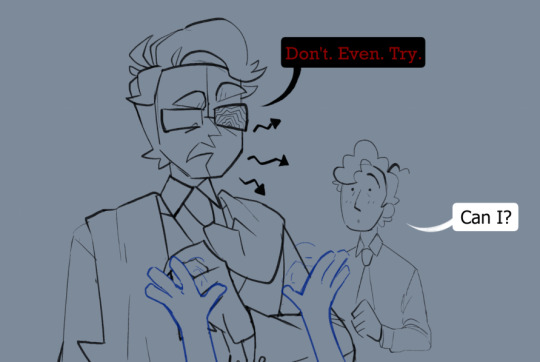
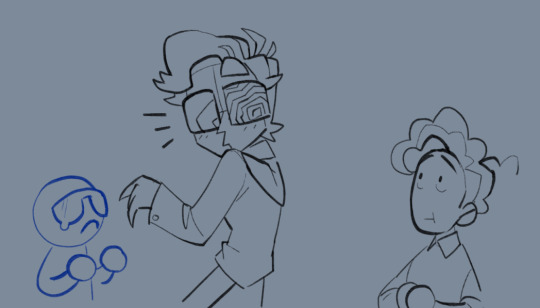
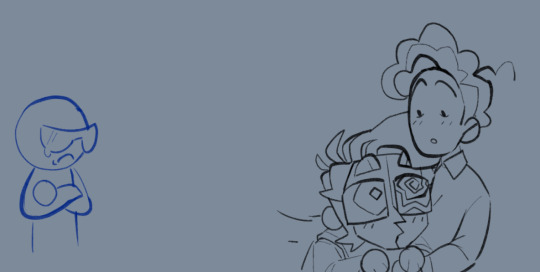
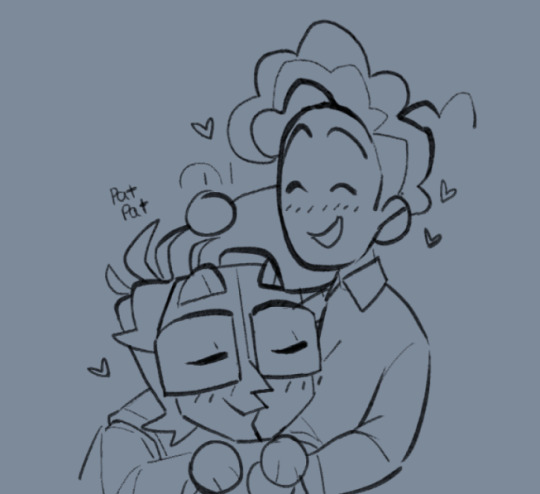
Only Stanley is allow to... unless you manage to be really close to him that is.
#Walter is yearning for Stanley's headpats#he's like a puppy at times...#sort of#it would be really SAD to see them have an argument huh?#enjoy this while it last 👀#narratorverse#tsp narrator#the stanley parable narrator#narrator#narrator tsp#tspud#tsp art#tsp#tsp stanley#stanley tsp#stanley parable#the stanley parable#insane!narrator
187 notes
·
View notes
Text
i think nephset is very fun to think about and analyze because nephthys basically revolves around seth (and seth to nephthys in a similar vein) (minus the whole "being hypnotized by osiris and forced to carry their baby (anubis) and lying to seth about it. which is not really her fault) (also i dont care what anyone else says anubis is seths son) but i find it very odd that when present day nephseth is brought up especially in the newer chapters theres this. pushback to it. and the reason why really feels like its because she gets in the way of the yaoi rather than it being the fact that they probably would not work together anymore
like dont get me wrong. i currently believe that seth and nephthys cannot come together again without it being really awkward. it has been awkward for so long and their relationship has been strained so much by seths insanity that it definitely does not work. if it were to work they would need intense couples counciling (that would also not exist). however i feel like most people struggle to realize you can both ship/like/think about nephseth along with horuseth and it doesnt devalue the latter at all
#ennead#nephseth is one of the few m/f pairings i really like. mostly because its nostalgically sweet#but also consider the fact i dont really fw horuseth at all Lol. Lmfao even.#my seth otp is seth/nobody because i think he deserves to grow and change as a person without having to lean on anyone#of course horuseth exists because seth NEEDS to lean on someone. aka horus who offers it willingly#but i feel like once hes worked through a big chunk of his trauma he would really benefit by not having romance or family on his mind#for once#nephthys also does deserve better. why are bl fans lowkey misogynistic sometimes#idk nobodys happy in ennead in the end i think. its all just fucking misery here#also yes i have seen this argument against nephseth on twitter for this very reason and im like Hm. okay.#txt#ramblings of an insane man
34 notes
·
View notes
Text
remember when the Doctor gave more mercy to the Daleks and Davros. y'know, genocidal killing machines as explicit stand-ins for the fucking Nazis? who, even after witnessing Davros almost wipe out THE ENTIRETY OF REALITY ITSELF actually tried to help him?
yeah. yeah. yeah, I remember that. does RTD or any of the other writers remember that?
but having a stand in for a pro-Palestinian genocide survivor and freedom fighter who was deliberately painted as wanting to kill 3 trillion people because the corporation genocided his home planet? ah. step too far. can't have that, can we?
#would be great having a rational conversation about it with my parents#but that would just straight up turn into an argument#i feel like everything is making me go insane#TV and film literally has a responsibility to not fuck up genuinely serious topics#doctor who#the interstellar song contest
14 notes
·
View notes
Text
Buddie being together & possibly one of them being transferred out bc they can’t work together only to be put in a situation that they have to chose a patient over their injured partner a la Flashpoint
#911 abc#eddie diaz#buddie#evan buckley#buck x eddie#then they get to stay together bc they work the best together#idk. I feel like it’d be an interesting plotline#also would address the “firefighters can’t be together & work together” argument that people are using as some kind of “gotcha”#honestly idk that I can see Buck picking anyone over Eddie tho 😭#Eddie is usually the more levelheaded one I feel. better at compartmentalizating#& better at keeping his head when Buck’s hurt. but idk. they’re both insane
31 notes
·
View notes
Text
fascinating seeing ppl on twitter see someone who they think is just a regular sex-negative abstinence-only conservative troll only to slowly realize their actual belief system is that humans in their entirety should never have sex bcuz reproduction is inherently immoral and unnatural and humans should go extinct so we no longer experience rape abuse cancer suffering etc which we deserve. and that they believe their existence is making the world a worse place and their mother shouldve never given birth to them. like when u think someone is a level one tier bigoted conservative crazy person and then u discover a type of guy you didnt even know existed. can't even really be mad about that cuz it isnt like this is a mainstream public opinion. this is just some weird guy on twitter who wants to annihilate humanity
#not a new type of guy FOR ME im very familiar with this particular breed of nihilistic freak#it's kinda funny when someone is trying the typical liberal progressive catch-a-hypocrite argument#where they're like “are you saying you shouldn't have been born either” as a gotcha and someone is immediately just like well yes....!!#sometimes people's internal beliefs are entitely consistent and also batshit insane#which is why pushing back against people's nihilism and hatred of humanity as a collective group is a good thing#wow u hate humans thats so edgy and fresh.... do you want rveryone to become celibate#and never have kids so humanity goes extinct and we all die bcuz we dont deserve to be alive??#honestly i would kinda support the cause if they just said sex is unnatural and refused to elaborate. like yeah sure asexual supremacy#Why are you having sex are u gay or something. thats literally someones genitals 😔#txt
8 notes
·
View notes
Text
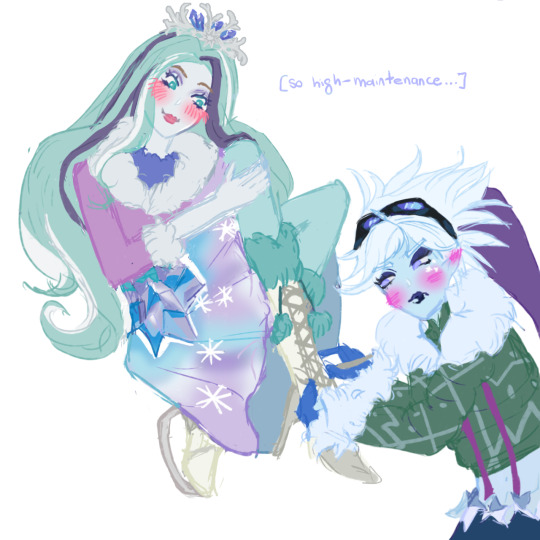
high maintance... sorry i had to draw the enemies as lovers :^(
#crystal winter#jackie frost#crystal x jackie#ever after high#ever after high fanart#im sorry#I see two enemies and I draw them as lesbians#Its a curse#Like cmon their enemies to lovers plotline would be insane#why did jackie keep on bringing crystals shoelaces#mayhaps she wanted to tie them herself#like CMON jackie would complain about taking care of crystal but she would be secretly enjoying it#bonus is that jackie couldve been someone that helped crystal get ready in canon#since she was working for the king#taking care of you loved one is so tender and sweet#this is my main argument for them#I think im super alone in this one
45 notes
·
View notes
Text
It can be really embarrassing to have a special interest in something deemed for children. I have a special interest in puppetry/henson creations and I’m really passionate about early childhood entertainment and education (specifically public broadcasting tv for kids. I think it’s incredibly important that children have that) and me and my best friend (who also loves this stuff) are planning a trip to Sesame Place park because hell yeah we love amusement parks and we love Sesame Street. I am so excited for this trip. And I cannot express that because I am a grown ass adult excited to go to the Elmo park. I can’t even express that I love it and it’s my career goal to create stuff like Sesame Street because then people are like lmfao you want to be a puppeteer? Can a girl not want to see Elmo without shame can I not get really excited to see Big Bird?? This world is a prison.
#toca.txt#special interest in puppets animatronics costuming and stage design is a curse of get made fun of forever#also an interest in theme parks#GOD FUCK THATS EMBARRASSING.#hi yes I know a shit ton about Disney parks no I’m not a Disney adult I’m just autistic#do you hear how that sounds??#I am doomed.#I’m looking forwards to this trip but this also means I’m going to get really really excited#and when I get excited I have a hard time being quiet and staying still so that means weird looks from others#sighs it’s easier to handle in places like an aquarium because like. that’s not a place designed for kids#I’m afraid it will make me look like a freak at sesame place#whatever I’ve saved up money for this Toca’s buying a big bird plush if it kills them#toca be normal and not spout out facts about Sesame Street development at random intervals challenge failed#I’m normal girl I promise#I do not have an entirely muppets themed outfit for this trip day nuh uh#i don’t have Kermit pants Kermit headband Kermit shirt Kermit water bottle and Kermit plush and Kermit camera I’m entirely normal wdym#Kermit isn’t Sesame Street but toca does not have a lot of Sesame Street merchandise because toca is 19 and not 5.#I am working on it tho.#big bird plushie big bird plushie big bird plushie helllllll yeah#maybe I will get a Bert and Ernie for me and my friend that would be funsies.#sighs sorry I’m crazy I’m just#really passionate about children’s entertainment#for some reason.#I don’t have time to explain it but google pull up mister Roger’s 1969 senate argument about children’s television#that explains it.#toca rambles sorry I’m insane I’ll work on it
12 notes
·
View notes
Text
More Winchester vs Batfam thoughts
Dick and Dean bonding over being inhumanly beautiful people who were sexualized from an early age and using their sexual nature as a shield.
Sam and Jason bonding over feeling like they'll never be as good as their big brothers.
Sam and Jason bonding over love of literature.
Dean and Jason being total nerds about guns and Jason feeling so vindicated about his gun stance.
Dick talking to Sam about how everyone deserves a chance to reform and that resonating with Sam in a way that frightens him.
The four of them bonding over a super overprotective parent that also was cool with them being child soldiers.
All four of them bonding over living nomadically (or homelessly) in their younger years, and rheir various experiences with poverty (Sam and Dean totally make fun of the other two for becoming rich boys.)
Endless hours of morality debates that absolutely end up with someone with a broken nose.
Giving each other lock picking tips
Dick and Sam bonding over being The Smart Kids that then get shown up by a computer super genius (Tim and Charlie)
Winchesters making fun of the bat boys for being citykids, batboys mocking the Winchesters for being small town hicks.
All of them bonding over their love of cool cars (Sam acts like he doesn't care, but 100% has Opinions.)
Sam and Jason bonding over college dreams
Sam and Dick bond over being mathletes (nerds!)
Dick and Dean bond over thinking school overall was a waste of time.
Dick and Dean bond over having to take care of their dads when they were young.
Dick and Sam bonding over their desperate desire to be good but also harboring a lot of deep anger.
Jason and Dean not used to having to compete for being the funniest person in the room.
Jason and Dean bonding over their desire to protect young kids.
Dick and Dean commiserate in being the older, but shorter, brothers.
The four of them trying to compete in a trivia game. It does not go well. No one has a good time.
Dean: wait, so you two aren't real brothers?
Jason: I will shoot you in the face.
Dean: that's not what I meant!
#winchesters#batfam#dick grayson#jason todd#sam winchester#dean winchester#winchester bros#batbros#theyre all getting along here but 100% would eventually start to fight#i want to read an entire conversation of John and Bruce just Yelling at each other#it'd be so good#sam jason and dick are like yeah i regularly got into fist fights and arguments with my dad lol#dean looking at the three of them like theyre insane#dean being like “what so you just.... let your brother die and were normal about it?”#dick feels extremely judged
76 notes
·
View notes
Text
Someone somewhere has talked about this I’m sure but I imagine vividly Mulder flourishing post-FBI as a college professor. Who would hire a professor of the paranormal and extraterrestrial? Who knows. Anyway. They should put Mulder in his natural habitat— and if it’s not out in the field licking indeterminable substances and jumping off trains, it’s in a dimly lit room with a well-prepared slide deck and an hour and a half of lecture to talk through.
#fox mulder#the x files#txf#x files#endlessly entertaining. his elective clas would be v difficult to get into. and the gossip would be insane#Scully would stop by once or twice and his lecture would entirely derail as a wide eyed undergrad audience tries to follow the back & forth#of these two people who have been having this same argument for decades. love them.#lim on txf#lim posts
40 notes
·
View notes